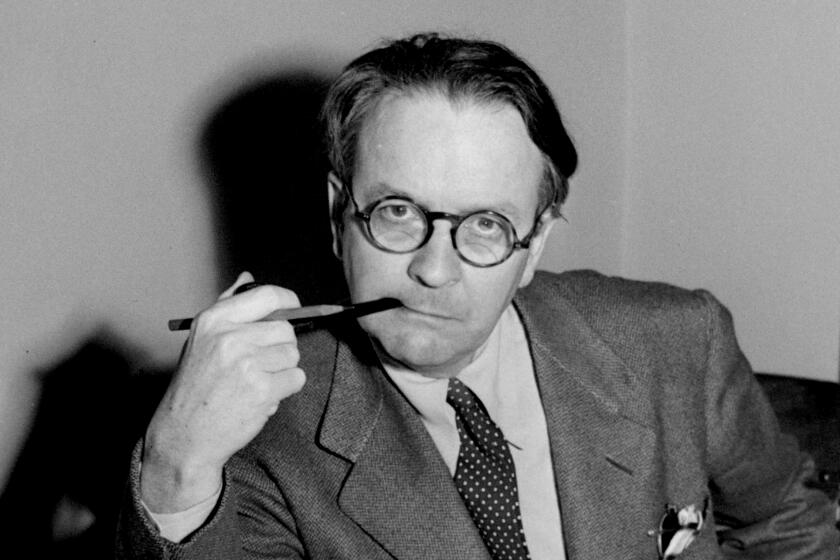Loss haunts Rabih Alameddine’s new novel, ‘Angel of History’
- Share via
A man awaits his fate at a San Francisco psychiatric hospital. His partner is dead. Nearly an entire generation is gone. But not all is lost for our hero, Jacob, born Ya’qub; he is the product of a brief tryst between a powerful man in Beirut and a woman from Yemen who later takes her gifted son to live in a Cairo whorehouse to thrive under the care of a voluptuous auntie named Badeea. Back in Lebanon, more or less ignored by his father, he’s so savagely beaten by bigger boys at a Catholic orphanage that his battered body must be sent to Sweden. In San Francisco, years later, he’s an Arab male and a homosexual and one of the last of his kind — everyone else felled either by the great calamity of AIDS or the furious meat grinder that is life as an Arab. Oh, and he talks regularly with Satan. And the Devil.
There’s plenty of reason to go crazy in “The Angel of History,” a new novel by Lebanese American writer Rabih Alameddine. Author of the daunting but exquisite 2014 novel “An Unnecessary Woman,” which was a lush portrait of a love affair with literature, Alameddine — sometimes described as “splitting his time” between San Francisco and Beirut — this time offers up a much more tart and rigorous read, a densely layered and ultimately agonizing series of stories in which our hero is haunted by a past he can’t seem to allow himself to forget.
In an early scene, when two young gays accost the aging poet in a humming restaurant, we don’t quite understand the depth of his anger.
“ ‘Her husband died?’ Jacob says to the one with frosted tips, interrupting a banal lament. ‘You think that’s horrifying? You feel sorry for her? She’s lived a full life. I had six friends die in a six-month period. … We were nothing but babies, where was she when we were dying, where were you?’ ”
Over frenetic and elliptical chapters, we come to know, in confusing snatches, more and more about the horror that life has been for Jacob, chiefly because of AIDS. His immediate grief is a lost love, Doc — but also all the friends they cared for and then buried.
There’s a deeper layer of sadness and frustration: The unique and also universal way home eludes Jacob, who knows all too well what one must do to survive. There’s one Arab tradition: the instinct “to travel with a bit of dirt.” Palestinians, Jacob muses, carry keys to apartments long since destroyed. Bertolt Brecht wrote of a single brick proving how nicely a house once stood. We all have our memories.
These scenes are interrupted by many conversations between the fallen angel Satan and the embodiment of evil, the Devil. Should Jacob, as the more nostalgic Satan hopes, strive to remember how he came to be who he is, or should he, as the more aggressively dark Devil contends, just give up and move on?
It’s not so easy, in love or before death, to make the correct decision. One of the tenderest scenes occurs when Jacob flees a pre-sickness Doc, who’s brought home another lover. In a bondage basement, Jacob finds relief when the master whips him and achieves sexual satisfaction. “He lay next to me, hugged me … . ‘You were a good boy,’ he said.” But about his actual lover, Jacob wonders: “Did you love me, or a lesser version of me?”
The idea of what’s real and who’s in control is handled most memorably with an electrifying story within the story, when Jacob imagines a couple who’ve moved from Muncie, Ind., to New York, where they encounter the truly groovy new accessory. It’s a man sitting in a cage in the center of their boss’ sumptuous Manhattan apartment. “It’s not like we could get a python,” explains the host, referring to onerous co-op rules. “So we got an Arab.” It’s both a searing comment on how Arabs are secondary citizens and a surreal condemnation of those among us who pretend the people we discuss don’t become objects as a result of our fascination, however well-intentioned.
Bodies live and die, but our history is more stubborn. Alameddine might laugh at us for asking for an easier portrayal; he seems not to care that some of us won’t get all the jokes — whether literary gossip, the politics of Yemen or the capsule history of gay men in America.
There’s a real tension reading “The Angel of History,” a discomfort in not knowing, accompanied by the vexing suspicion we’ll always struggle to make meaningful connections. As much as any of us might hope otherwise, this book’s fragmentary nature resists coherence. Jacob’s efforts in the novel are ultimately a kind of referendum on the fleeting power of any good story, however important.
Deuel is the author of “Friday Was the Bomb: Five Years in the Middle East.”
::
“The Angel of History”
Rabih Alameddine
Atlantic Monthly Press: 304 pp., $26
More to Read
Sign up for our Book Club newsletter
Get the latest news, events and more from the Los Angeles Times Book Club, and help us get L.A. reading and talking.
You may occasionally receive promotional content from the Los Angeles Times.









